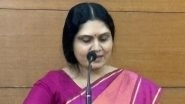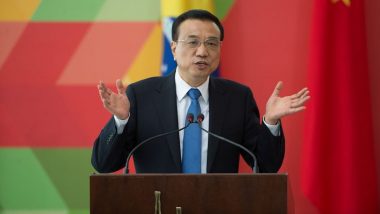Beijing, November 2: Former Chinese premier Li Keqiang, who died of a sudden heart attack on October 27, was cremated on Thursday here after President Xi Jinping and other senior ruling Communist Party leaders paid homage. The remains of Li, 68, were cremated at the Babaoshan Revolutionary Cemetery in Beijing, the state-run Xinhua news agency reported. China's national flags at Tiananmen Square, the seat of the country's power as well as all government buildings and foreign diplomatic missions, flew half-mast as a mark of respect for the departed leader.
President Xi, accompanied by his wife Peng Liyuan and Premier Li Qiang, other leaders of the ruling Communist Party and the government walked slowly up to Li's remains, stood in solemn silence to pay their tributes, and made three bows. They shook hands with Li's family members, offering their condolences. Former Chinese president Hu Jintao sent a wreath to express his condolences over Li's passing, the report said. Li Keqiang Dies: Former Chinese Premier and Top Economic Official for a Decade Passes Away After Heart Attack at 68.
Other Communist Party and state leaders either paid their final respects at the cemetery or expressed their condolences through various means. Senior officials from central departments, Li's friends and representatives from his hometown also mourned his passing at the cemetery. Thousands of people visited Li's childhood home in Hefei in Anhui province to pay their respects.
Li, who was once a contender for power against Xi, a decade ago died of a heart attack on October 27 in Shanghai. He retired as premier in March this year. An obituary issued by the ruling Communist Party of China (CPC), the Cabinet and Parliament described Li's death as a huge loss. He was extolled as an "excellent CPC member, a time-tested and loyal communist soldier and an outstanding proletarian revolutionist, statesman and leader of the Party and the state."
Earlier reports said the government has asked student bodies of some Chinese universities not to organise private commemoration activities for Li in an apparent bid to avoid social turmoil. Li had a reputation as a moderate reformist and won the admiration of the Chinese people for managing the economy which was in a slowdown mode during his 10-year tenure.
Though ranked number two in the ruling Chinese Communist Party hierarchy, Li was side-lined and mostly spent his years in the government focusing on the management of the economy, while Xi has emerged as the most powerful leader after Party founder Mao Zedong, heading the party, the military and the Presidency.
In the past, the Chinese government had reportedly taken precautionary measures to avoid similar student protests at Tiananmen Square in Beijing in 1989, following the death of popular moderate Communist Party chief Hu Yaobang. Thousands were killed during the mass protests. Li Keqiang Dies: Former Chinese Premier Passes Away After Heart Attack At 68.
Li is among very few retired Chinese leaders to have died before reaching the age of 70. Most stay healthy and live well beyond 90, or even 100 and their longevity is attributed to the comprehensive medical care and security privileges provided to party and state leaders even after retirement.
The government has ensured that the protocol for Li's mourning was on par with former premier Li Peng who died in 2019. In China's strictly hierarchical system of formalities, only the top leaders – such as former president Jiang Zemin, who was afforded a state funeral in December last year – are entitled to full honours, including a memorial meeting which is televised across the country.
Political commentator Chen Daoyin, a former professor at Shanghai University of Political Science and Law, said Beijing is doing everything it can to reign in the potential political risks of Li's unexpected death.
“A proper funeral protocol is a key part of addressing the concerns of liberals. So far, it has allowed people to pay tribute to Li Keqiang freely and there has been no apparent censorship while keeping a watchful eye on the universities,” Chen said. “All this shows Beijing is tracking this very carefully, trying to strike a very delicate balance,” he said.













 Quickly
Quickly


